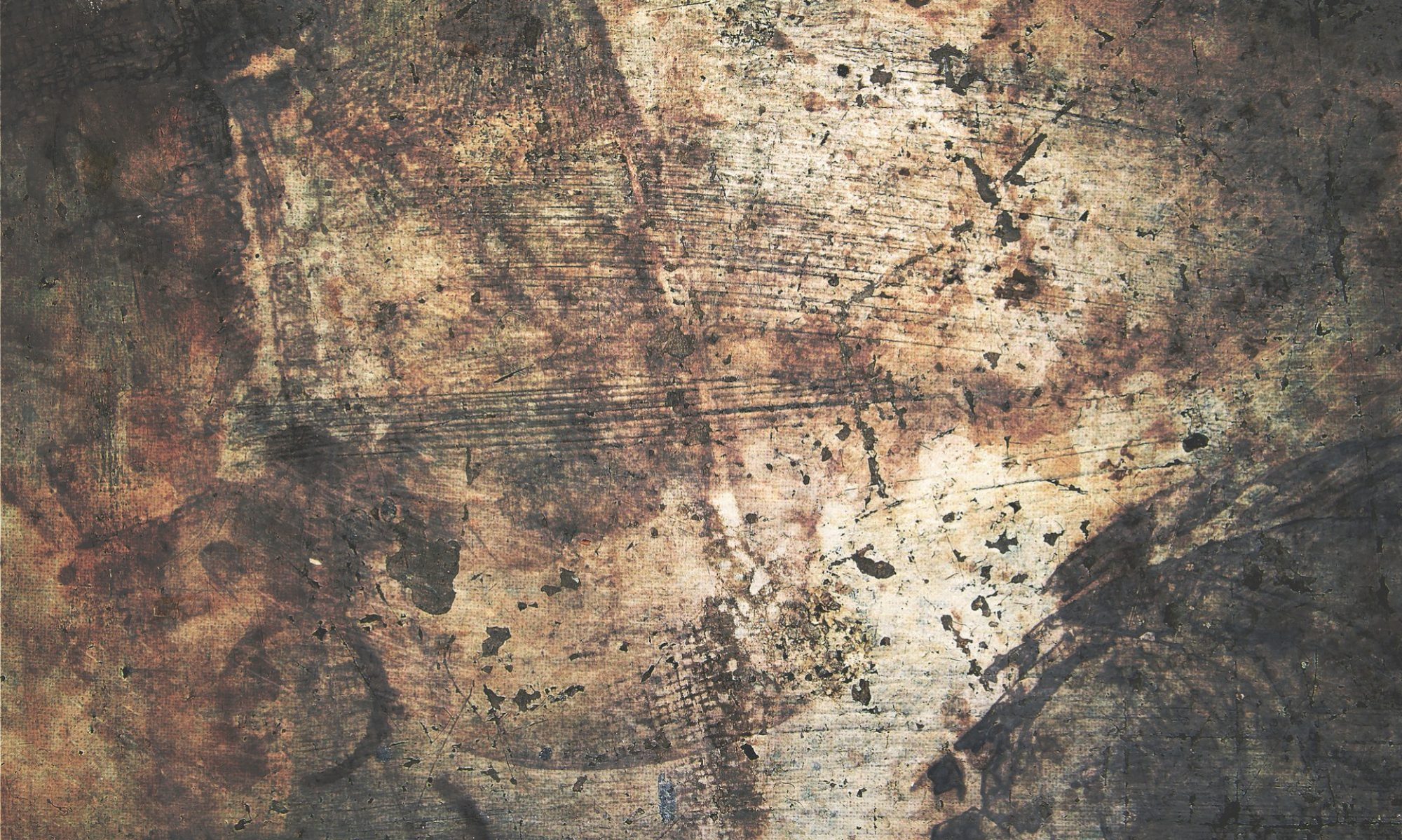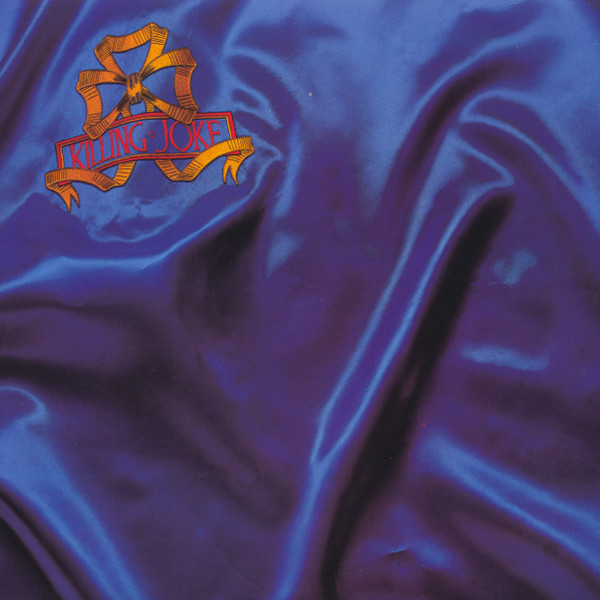The Damned, Witch and Vacuum at RISING
The Forum, Melbourne, Friday 16 June 2023
Towards the end of The Damned’s tomb-splitting, dead-reanimating set, Captain Sensible jokes that the ‘willies’ of the Forum’s male statues are in a drawer somewhere because the ‘cult’ who previously owned the theatre have hacked them off in an act of mindless puritanism, so he wants to go find them. Dave Vanian, non-plussed by this silliness, declines the offer to join him. And here at the heart of this beautiful vignette is the delicate balance between neon absurdity and grave-black reverence which has powered The Damned whenever Sensible and Vanian are its dual-core creative forces. (The Forum was indeed owned by Pentecostal nutters between 1985 and 1995. They let the gorgeous 1929 landmark theatre fall into disrepair, but it was lovingly restored in 2016 – including, yes, the remodelling of damaged statuary – and reopened in 2017 as central Melbourne’s premier live music venue.)
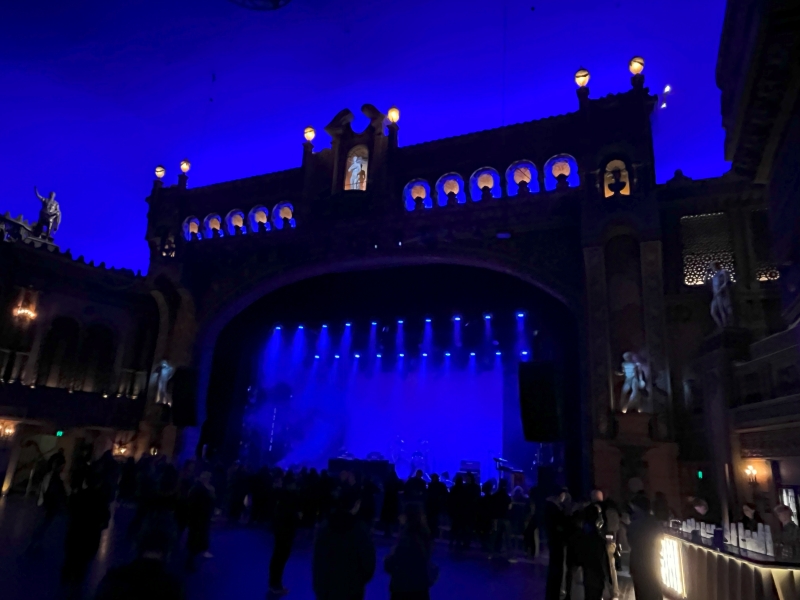
Based on book publishing alone, 2023 is officially the Year of Goth, with three studies of the subculture being released. John Robb’s The Art of Darkness (March), Cathi Unsworth’s Season of the Witch (May) and Lol Tolhurst’s Goth: A History (September). (I’m currently reading the Robb – it’s wonderfully detailed and brilliantly researched.) This being the case, it makes sense for Melbourne’s RISING festival (finally hitting two consecutive iterations after Covid kiboshed both the inaugural 2020 and the 2021 re-schedule) to celebrate the genre that won’t die with a concert programmed to reflect three of the key strands of goth music: subterranean electronica, angsty post-punk, and doom metal.
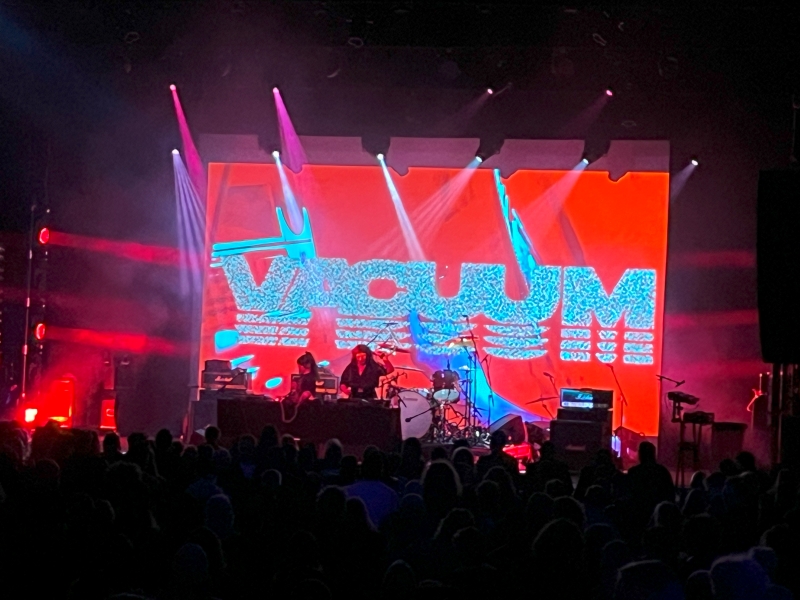
Before the first of the double headliners, Melbourne duo Vacuum (Andrea Blake and Jenny Branagan) deliver a short but highly effective set of industrial electro-goth combining loops, hypnotic drum patterns, found sound, live triggers/beats and repetitive spoken lyrics. These intoned lyrics – something of a fad among indie bands a few years ago – are both mesmerising and potent. Reminiscent in terms of vibe and flow of short-lived 80s psychedelic goth magicians Webcore, their dark-side monotonal chants and hell-hound sub-woofer drones hark all the way back to Throbbing Gristle, Hawkwind and the murkier strains of Krautrock. There’s elements of the original electronic mavericks Cabaret Voltaire and gothfathers Bauhaus in there too, as well as psy-trance and trip-hop, while their aesthetic is something like David Cronenberg meets Kenneth Anger.
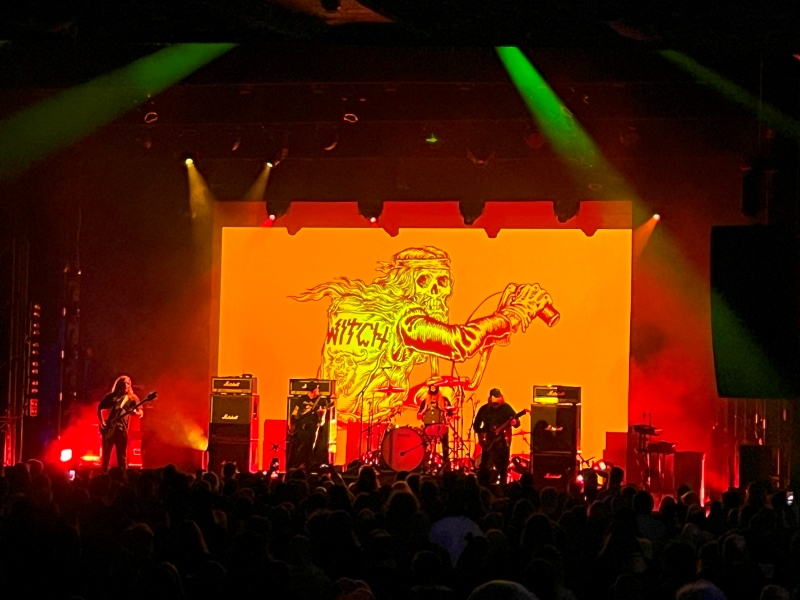
Witch have been around since 2005 and although they’ve only released a couple of albums, they’ve developed a devoted following with their alt-rock tempered stoner metal. You can still hear Sabbath, Motörhead, Maiden and drummer J Mascis’s (of Dinosaur Jnr.) beloved Deep Purple but these days the band sound more Southern Gothic than ever: their down-revved riffs enveloping you like a Louisiana swamp on Halloween, which, of course, makes them a perfect fit for the overall theme of the night. Being a bass player myself I can’t help but admire Dave Sweetapple’s bowel-juddering growl, created with a Marshall stack, a mid-slung Rick and plenty of pick/axe attack. Sweetapple’s bass and J Mascis’s drums (powered by a minimalist jazz kit) provide the engine room for a set of doomy, swampy grindhouse fug, all played under the watchful eyes of the band’s backdrop mascot: a skull-headed biker. The audience readily forgive them when during their set they grind to a halt after a false start, which only serves to render them endearing rather than demonic (is it just me or is this happening more regularly post-Covid?).
It’s only right that of the two nominal headliners, The Damned are on second, because their combination of punk rebellion, gothic flamboyance, garage pop and 60s psychedelia has influenced countless acts while The Damned themselves, like first-generation post-punk band Killing Joke, are still to receive their due when it comes to their standing in the culture. As with their musical (and temporal) cousins XTC, who have similarly eclectic and transatlantic tastes and influences, the central stylistic tension that has evolved between Sensible and Vanian has echoes of that between Moulding and Partridge.
Back in Oceania after a six-year hiatus (their previous gig in Melbourne was at 170 Russell) this is the last night of a six-date mini-tour of New Zealand and Australia. With a mostly stable line-up since 2017 (Vanian, Sensible, Monty Oxymoron and a returning Paul Gray were joined in 2022 by Will Taylor, who replaced 20-year veteran drummer Pinch) The Damned have, like Dracula at Davos, hit a rich vein since 2018’s Visconti-produced Evil Spirits. With four songwriters in the band, the new material has seen The Damned embrace the entire sweep of their musical history and combine it with an unmatched facility for adrenalised three-minute pop songs honed over 47 years. This line-up’s energy is infectious with Vanian constantly in motion and even Oxymoron coming out from behind his keys for a burst of mad-professor pogoing during the final encore.
It’s heartening that all of Melbourne’s goths appear to be in attendance, from private-club Boomers to Gen Z TikTokkers, with fashion ranging from smart black leather and tattered lace to ghostly face-paint and teased-to-death hair. Launching into set opener ‘Street of Dreams’, the Phantasmagoria title track, with its galloping toms and John Barry chord progression, the band’s four instrumentalists sound better than ever. Gray’s melodic, percussive bass (he’s another Rickenbacker fan) provides perfect counterpoint to Sensible’s trademark high-fret pyrotechnics and architectonic arpeggios; Monty’s keyboard washes and pads provide sonic texture and depth. After the short introduction, Vanian runs on stage in a black outfit accessorised with black fedora and black gloves. It’s always a shock just how slight a figure he is, but his eldritch presence and deepening voice (the baritone is a range which with care can last many years longer than that of a tenor) fill the theatre: ‘And we may be the haunted men / But we will hold our heads up when / We’re walking down the street of dreams.’ The lyrics perfectly encapsulate The Damned’s long and labyrinthine career while Sensible’s two solos are an immediate reminder of how underrated he is as a lead guitarist (I’d argue that the band’s two longest-serving members are UK national treasures both).
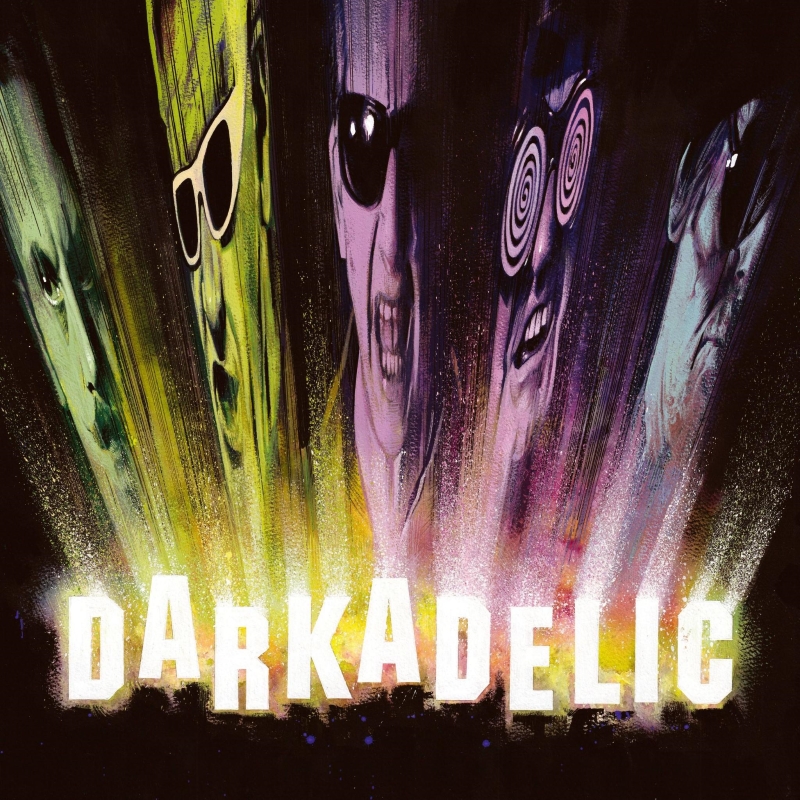
The next track is another album opener, this time from the tour’s titular work, the late-career masterpiece Darkadelic (in all the set features six track-ones, testament to The Damned’s commitment to creating a succession of absolute bangers with which to needle-drop their LPs). Akin to The Black Album’s ‘Dr. Jekyll and Mr. Hyde’ and Grave Disorder‘s ‘Beauty of the Beast’, ‘The Invisible Man’ (penned by Vanian and Gray) has associations with Universal horror and in particular with Claude Rains’s and Vincent Price’s portrayals of that role, but there’s a deeper more mournful quality to the idea of being increasingly invisible in a world of instant gratification and 24/7 engagement. The middle eight brings some levity with Vanian deciding that if you can’t beat them, then best to join them, combining monster horror with blunt-force consumerism: ‘Take some random chemicals anyone could mix / Inject yourself now for a number of weeks / Flesh just fades away till nothing’s left’ (a vibe that matches Hawkwind’s ‘The Beginning’ from their recent The Future Never Waits). A mad-scientist laugh propels us back into escapist gothic melodrama and another chorus. Vanian’s voice is just about holding-up (luckily there was a two-week rest before the band’s Avalon Stage Glastonbury appearance) and his existentially anguished growl on this number is supremely effective (‘Why, it’s part of my plan’; but the plan quickly unravels ‘Look at me, nothing but a faded memory’).
By this point some twat has thrown a beer can at the stage, which hits Dave right on his noggin, (though trouper that he is, he doesn’t react). Kinda mind-boggling that cans are on sale at the bar (especially as there’s no glass allowed and only plastic cups) but thank God one retro idiot didn’t encourage any others, and apart from a couple of empty plastics thrown later, no damage is done (though even a plastic cup can do significant damage if you’re unlucky; Paul Gray was hospitalised by one back in 1996). ‘Wait for the Blackout’ The Black Album’s opening track is both a live perennial and The Damned’s goth manifesto in 60s-psychedelia infused form: ‘The darkness holds a power that you won’t find in the day’.
The same album’s second track, ‘Lively Arts’ follows, and this is another song whose themes have developed enhanced poignancy over the years. ‘And if I got my way, those idle rich would pay’ (that sublime pun on ‘pay’ cutting much deeper 43 years later). The tension at the heart of the song between the band’s working-class background and the agency with which to create art that is increasingly denied to so many from non-middle-class backgrounds is telling. As is the lack of recognition with which artists from working-class backgrounds still must contend (The Damned quite justifiably spending many years feeling they were denied the recognition given to their more affluent, accessible and acceptable peers).
Darkadelic provides the next five tracks, sequenced as on the album (3, 4, 6, 8, 10). ‘You’re Gonna Realise’ is a perfect sub three-minute song about confronting aging and death – and ultimately reaching acceptance: ‘A renaissance of your soul / Doors of perception awaking all.’ Vanian, who wrote the song, is clearly singing from the dark depths of his undead soul and the effect is both mournful and uplifting. Sensible’s ‘Beware of the Clown’ is perfect counterpoint: wry observation on the surface with seething rage underneath. Vanian dons an entirely un-gothic red nose to sing about the endemic corruption of Boris Johnson, Liz Truss and the lethal, grifting Tories. With Vanian removing his clown nose and the Captain having been provided one by a roadie, Vanian delivers the killer lines: ‘Then one day the clown / Is gone like magic / Replaced by a clone / Equally tragic’. It’s The Who’s new boss/old boss for the UK’s post-Brexit catastrophe. The punningly witty and mature detachment of the lyrics sketch an attitude that’s essential for anyone who wants to engage with English politics without going totally insane, but the white-hot anger underneath is palpable (just as the red noses mask righteous fury).
‘Wake the Dead’, a Sensible-Martin Newell co-write was specifically composed to be played at the funerals of Damned fans after the Captain heard that some were using Damned tracks as part of their last rites. It’s a terrific number, full of gothic liminality and pagan-adjacent spirituality: ‘With the ether thin between our worlds / And as we end so we are begun’. Vanian’s voice has the perfect timbre for this evocative rock’n’roll mass: darkest velvet and gossamer lace opening the boundary between the living and the dead so that the two can commune. Galloping drums suggest a hearse-and-horses careening through Black Park in a Hammer horror, while the chorister-style chant of ‘Wake the dead’ is genuinely spooky. Sensible’s urgent chugging, haunted picking and a magnificent, plaintive solo all contribute to what should become a Damned classic and another live staple.
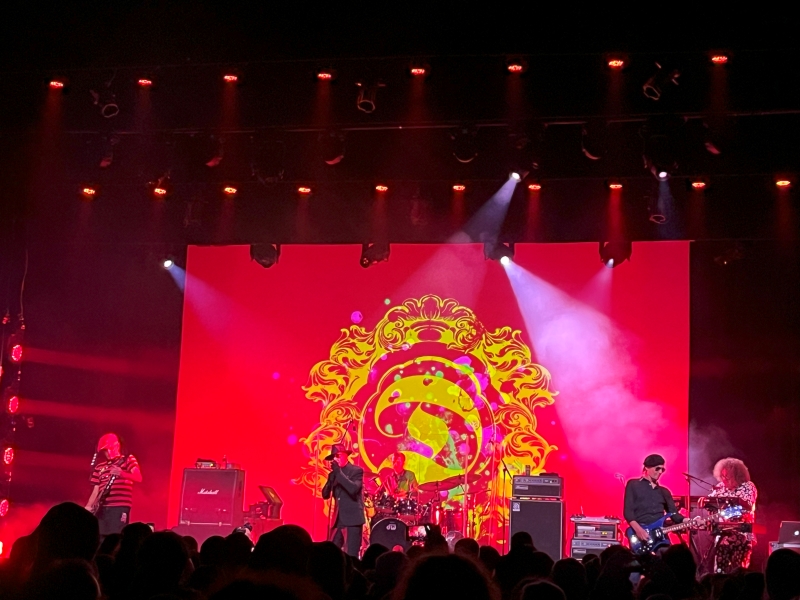
After a trilogy of songs with serious themes, a welcome break is provided by Gray’s ‘Motorcycle Man’ which, as you would expect, is kicked into start by a driving bass riff. It’s sonically reminiscent of both Hawkwind and American garage psychedelia, with some terrific keyboard work from Monty, bringing a Middle Eastern flavour to the bridge. But even here in what is ostensibly a song about freedom and companionship there’s a whiff of the album’s core theme: confronting aging and death. ‘Time passes faster than we know / One day we’re gonna wake up dead.’
Sensible asks the crowd if they dig glam rock. There are a few cheers. T. Rex, Sweet, Slade and Alvin Stardust are namechecked ‘plus the other one we don’t mention’. Though perhaps there’s not enough love from the audience considering the massive influence that glam had on punk and its post-punk spawn. While punk mostly disdained the excesses of prog, which was seen as a middle-class endeavour with its sixth-form common-room fans, classical stylings and top-heavy equipment, punk looked to glam and metal, both of which had a far more working-class provenance (though as we later learned, many key punk and post-punk musicians were in fact massive prog-heads). Visceral, rhythmically primal and intensely theatrical, glam’s uncompromising style and tom-heavy beats influenced The Damned, Adam & the Ants and Killing Joke to name just three. ‘Leader of the Gang’ is both celebration and epitaph but also carries a wonderfully nuanced view of so-called ‘cancel culture’ and the ongoing argument about whether a creator can (or should) be dissociated from their work. On the one hand: ‘…the songs are seldom played / Though they still sound just as great’ but on the other ‘These days it doesn’t seem so fun / Thanks to the awful things you’ve done.’ It’s a mature and sophisticated burst of cognitive dissonance.
The set now takes a giant step back in time to the band’s 1977 debut Damned Damned Damned and ‘Born to Kill’. The first Brian James number of the evening, the song takes on a completely new meaning in context of the rapid rise of the far right, with the lyrics plausibly sounding like they might suggest the song’s protagonist is an American ‘libertarian’ gun-lobby nutter. ‘Love Song’, the opener of 1979’s post-James Machine Gun Etiquette was the track that proved Sensible could pen a sub three-minute classic to stand alongside James’s best (and 44 years later anyone who identified him as a songwriter to watch should pat themselves on the back, as he and Vanian are currently in a purple patch). Here Sensible again – this time somewhat self-effacingly – shows-off his guitar prowess ending with a mic-stand power slide, which provokes Vanian affectionately to call him an ‘egomaniac’.
Straight into Machine Gun Etiquette’s second track, the Scabies-penned ‘Second Time Around’ and Sensible’s guitar almost-quoting the ‘Rock ‘n’ Roll (Part 2)’ guitar riff, in case the Captain’s previous point about glam hadn’t quite sunk in. The audience finally fall into call-and-response lock-step with the band, taking the energy level in the venue up several notches. The track’s now-preferred title is an apt comment on the number of times The Damned have been written-off but have come back stronger, their current renaissance arguably their most engaging yet: ‘Back to haunt you with our sound, second time around.’ Proving the doubters comprehensively wrong yet again. ‘We’ve still got it!’ says Sensible, and one can only nod in awe.
The penultimate number before the encores is the opener of 2018’s Evil Spirits, the Vanian-penned apocalyptic sci-fi mini-opera ‘Standing on the Edge of Tomorrow’, which has only become more terrifyingly urgent in the intervening five years. Cannily re-purposing the widescreen melodrama that drives ‘Eloise’ for the #DontLookUp age, the song addresses our ‘dystopian generation’ with a dire ecological warning. With global heat records being broken on land and sea, flash floods and forest fires, the tomorrow-precipice is already crumbling beneath our feet. ‘This time could be the last time / Maybe the only time to get it right.’ If that time still exists, it is now. Our coffin is very nearly nailed shut.
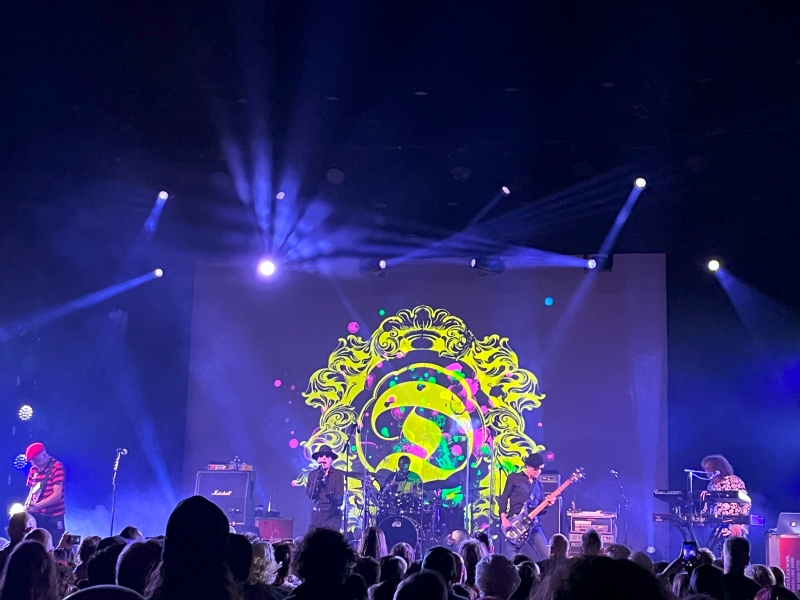
After pleading for us to avert our self-created demise, ‘Neat Neat Neat’ provides both respite and counterpoint. Although ‘New Rose’ was The Damned’s first single, this live perennial is ground zero for UK punk: album one, track one. And the band deliver a blistering rendition replete with a stonking over-the-back guitar solo from the Captain, an ultra-tight breakdown and a hard out before the band leave the stage to rapturous applause.
The band’s return is punctuated by Vanian casually stating that ‘We’re nearly at the end, you know’, which cuts especially deep in context of the set’s themes of confronting death and climate catastrophe. The next song is pure Vanian-the-showman (covering Barry Ryan’s ‘Eloise’ was a long-standing wish), and first in what seems like another extreme juxtaposition. Sensible again shows off his lead guitar chops with a compact solo in the outro.
This time it’s Vanian with the silliness, as he introduces the next encore as the Captain’s ‘Wot’. Running with this throwaway gag, the Captain tells the crowd that he can ‘still remember the chords’ then asks us whether we’d prefer a rendition of his tongue-in-cheek 80s yacht-rap hit or ‘Smash It Up’. The audience seem evenly split, but by the looks of Vanian’s body language there’s no way he and Sensible are engaging in a rap battle no matter how the vote goes so ‘Smash It Up’ it is, which the Captain dedicates to ‘departed friends Algy Ward and Marc Bolan’ (Ward died in May). This is the song (in two of an-originally planned four parts) that cemented that The Damned were always about more than three-chord tricks and rebellious rage, the song’s multi-part tonal shifts already evincing an extraordinary eclecticism of influence, including foreshadowing of the dark, Lynchian lounge-crooned nightmares that were to gain prominence as the band’s career progressed.
Sensible asks the crowd to cheer as though he’s Ed Sheeran, then takes the opportunity to riff on the theme of ‘Lively Arts’ and slag off Mumford ‘and fucking’ Sons and Ed Sheeran as a bunch of wankers from public schools: middle-class musicians who have it easy (though there’s arguably few musicians as hard-working as Sheeran whatever you think of his songs). If perhaps his targets are a tad too easy, the chip is still proudly on the Captain’s shoulder and to be honest it is fully justified, Vanian confirming that as well as being poor when they started out, they’re still poor now.
The second pair of encores starts with track nine from Darkadelic, Sensible’s ‘Girl I’ll Stop at Nothing’ – a showcase for Monty’s keys and another Damned song that hides deep themes in pop tropes. Impishly kicking-off with three punk chords, it immediately segues into something much more complex. The lyrics sound like another of the band’s anti-love songs, but below the surface is a cry for action and revolution against apathy and anaesthesia, the protagonist singing about how he needs to act now or lose everything rather than about how he’ll stalk her till she comes around. The bitter irony of being lucky ‘to live through times like these’ masks an even deeper level: the existential acceptance that for all the ‘witty repartee’, life remains ‘the perennial mystery’. A valedictory exclamation of hope by Vanian – ‘Darkness must give way to light’– is immediately followed by Sensible joining a shout of ‘ENOUGH!!!’ It’s as much heartfelt plea as hard-slog wisdom. Monty’s swirling keys are front and centre before a breakdown leads into the final number, which is, of course, the band’s (and UK punk’s) first single from October 1976: ‘New Rose’. The Damned’s beginning is an end, but an end is always a beginning.
